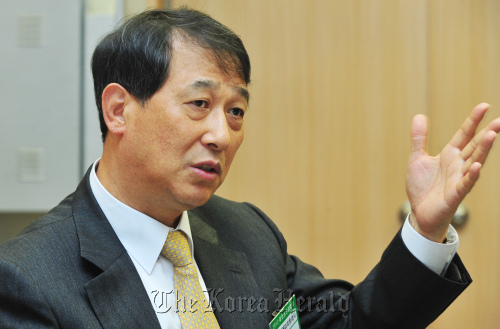[Herald Interview] Resources diplomacy takes time, patience: ambassador
By Korea HeraldPublished : Feb. 26, 2012 - 20:50
In the wake of the CNK International stock-rigging scandal, South Korea’s so-called “resources diplomacy” has become a point of contention due to the high risks and low efficiency in searching for oil and other energy resources overseas.
Questions were raised whether Korea’s signing of an MOU with the United Arab Emirates early last year to develop three oil fields in Abu Dhabi was overblown, because neither side has announced the signing of an official deal yet.
However, resources diplomacy takes much more time than the public thinks, and it also needs patience before seeing tangible results, said the Korean ambassador to the UAE.
“It is always difficult to carry out resources diplomacy. But it would be wrong to prematurely presume (that the deal was overblown),” Kwon Tae-kyun, ambassador to the UAE, said in an interview with The Korea Herald.
Questions were raised whether Korea’s signing of an MOU with the United Arab Emirates early last year to develop three oil fields in Abu Dhabi was overblown, because neither side has announced the signing of an official deal yet.
However, resources diplomacy takes much more time than the public thinks, and it also needs patience before seeing tangible results, said the Korean ambassador to the UAE.
“It is always difficult to carry out resources diplomacy. But it would be wrong to prematurely presume (that the deal was overblown),” Kwon Tae-kyun, ambassador to the UAE, said in an interview with The Korea Herald.

“The two sides will soon sign an official deal to develop the three untapped oil fields in Abu Dhabi,” he said, setting the time frame between late this month and early March.
The MOU was signed during President Lee Myung-bak’s visit to his UAE counterpart Sheikh Khalifa bin Zayed Al Nahyan early last year. A deal would allow Korea to secure at least 1 billion barrels from the existing oil fields in Abu Dhabi starting in 2014, news reports had said.
The reason that the government cannot reveal how much progress it has made since the announcement of the MOU signing is that it may affect the negotiation results, he added.
The UAE is the only country where Korea can tap into development projects in energy, construction and renewable energy at the same time, Kwon said.
Korea is seeing explosive growth in the construction sector, especially in the UAE, he said.
The amount of plant construction deals Korea has won in the UAE over the past three years adds up to one-third of the total deals that it has won in the country so far.
In 2009, a Korean consortium won a $20 billion project in the country to build four nuclear power plants ― the biggest single contract Korea has won overseas.
“Some people worry about nuclear reactors since the Fukushima disaster but the project in the UAE is going as scheduled. They’re fully prepared for any earthquake in Iran or a tsunami in the northern Indian Ocean,” Kwon said.
The Emirati people have increasingly become very interested in Korea’s medical services, which is something Korean hospitals should notice, he said.
Last December, three Emirati patients came to Korea to seek medical help, which was supported by the government of the UAE. The UAE often sends people suffering from difficult-to-cure diseases overseas to countries such as the U.S., Germany, the U.K. and Singapore.
It was the first time they sent patients to Korea.
“Patients themselves choose the country and they chose Korea. They were impressed by the hospitality, efficiency and cleanness of Korean hospitals,” Kwon said.
Medical service is an almost untapped sector which can attract oil money from the UAE, he said.
By Kim Yoon-mi (yoonmi@heraldcorp.com)
-
Articles by Korea Herald




















![[Today’s K-pop] BTS pop-up event to come to Seoul](http://res.heraldm.com/phpwas/restmb_idxmake.php?idx=642&simg=/content/image/2024/04/17/20240417050734_0.jpg&u=)